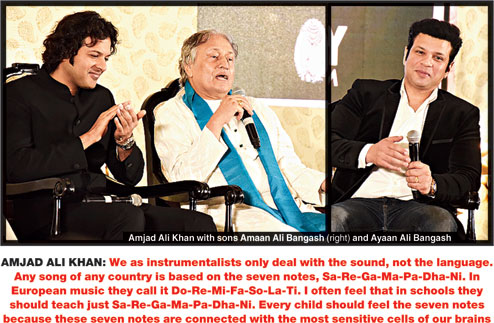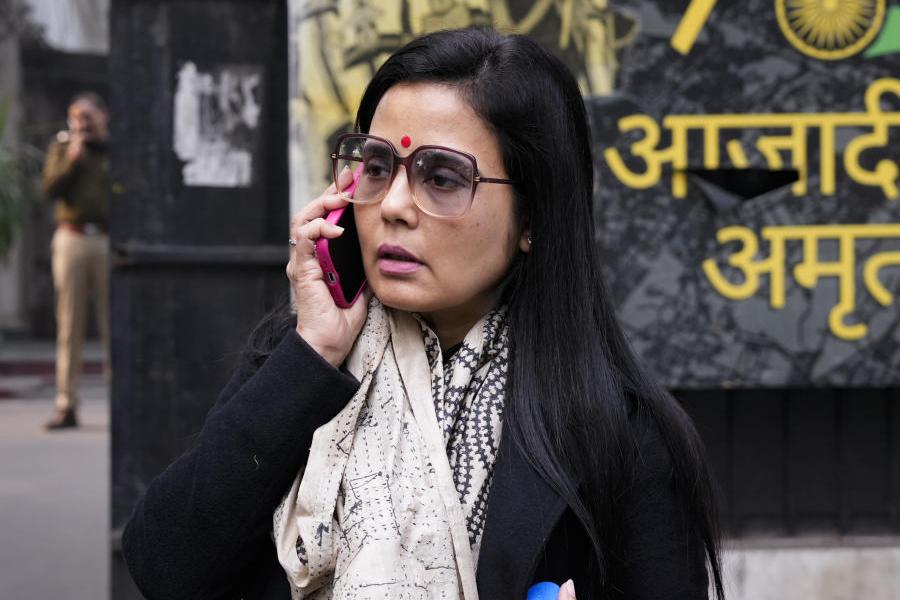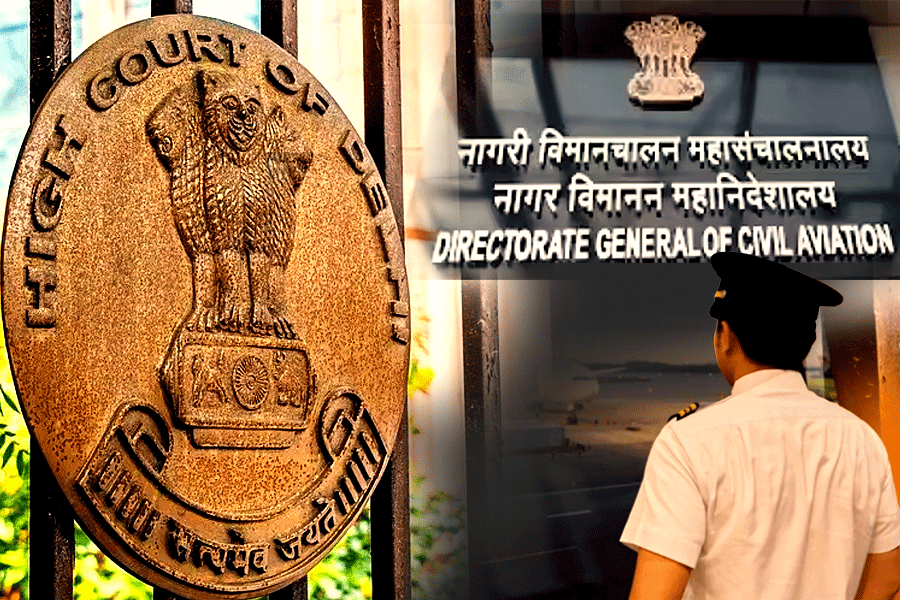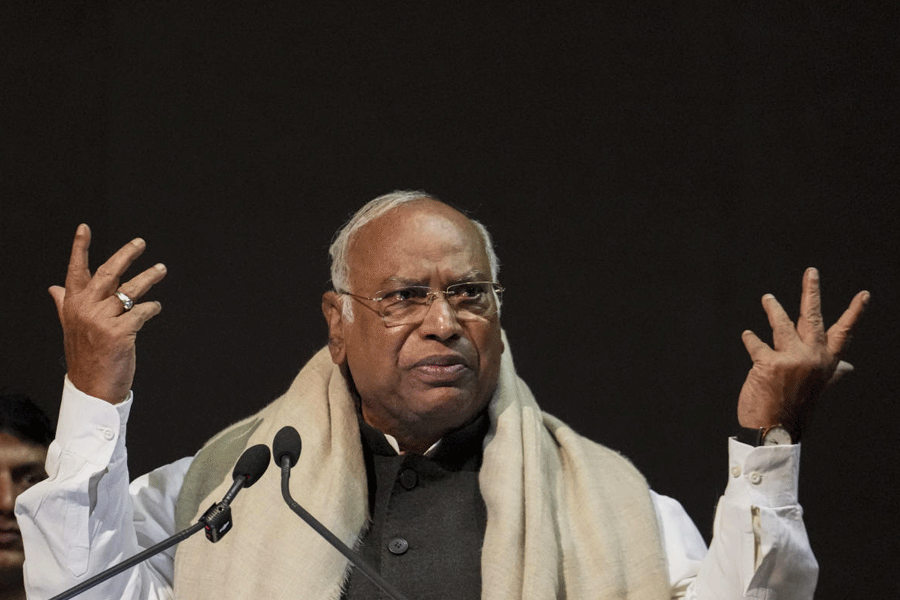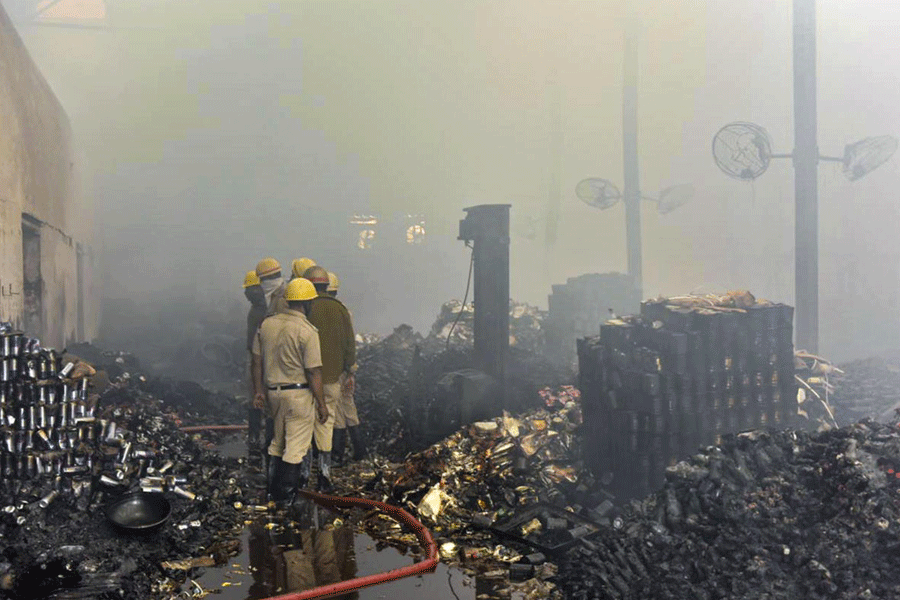
From music to discipline, privilege to pressure, sarod maestro Amjad Ali Khan and his sons and disciples — Amaan Ali Bangash and Ayaan Ali Bangash — spoke about their Senia-Bangash dynasty, their father-son and guru-disciple relationship, and much more at Legacy In Rhythm, organised by Ladies Study Group at Taj Bengal on July 25. In conversation with journalist Sagarika Ghose, the evening was peppered with the humming of melodies and cracking of quips. Excerpts.
FAMILY OF MUSICIANS
Amjad Ali Khan: It is a big responsibility in my case because my father (Hafiz Ali Khan) was very old when I was born. I was the youngest child. He was more like a guru and I couldn’t take any liberty in front of him. He gave a lot of attention to me, since I was the youngest, and that was my advantage. But at the same time I could not enjoy the freedom of childhood.
I became responsible right from the age of 10-11 and people started inviting me from the age of 12. There was one of the biggest festivals in Calcutta called Sadarang Music Conference. So my father was playing and I was also invited to play. The most number of concerts in my life have happened in Calcutta.
If you are born in a family of musicians, it is a system that the child is pushed onto the stage to feel the audience and the stage. So, that was done in Gwalior. I was born there... our ancestral house, which has been converted into a museum, called Sarod Ghar.
FATHER AND SON
Amjad Ali Khan: I only regret that I could not listen to my father’s concert when he was at the peak of his career. I have heard stories about my father’s performances from Bismillah Khan saab, Vilayat Khan saab….
Amaan: It was not very easy and it is still not very easy being Ustad Amjad Ali Khan’s sons. I share a beautiful relationship with him... he is my teacher and my father, but it is also a very complex relationship. As a child, you really don’t know how to behave, as a son or as a student? If I may take the liberty, I don’t know if my father sometimes knew whether to be a father or a teacher.
Ayaan: I am extremely blessed to be born in a family where the air we are breathing and the language we are speaking is all about music. But though the pressure was not conveyed directly, it was always indirectly there. I think this is the greatest wealth my family has and for my father, it was only natural to make us a part of that journey. Of course he did give us that freedom… though I think he would have been disappointed (if they said no to sarod) though he would not admit it.
.jpg)
JINGLE BELLS ON SAROD
Amjad Ali Khan: There is a documentary film... at that time they (his sons) were very young. There was a shot where I was teaching both of them and this gentleman (points at Ayaan) threw his plectrum…. It was difficult to create the atmosphere. So I played Jingle Bells and Old MacDonald Had A Farm and all the nursery rhymes on the sarod (laughs).
We as instrumentalists only deal with the sound, not the language. Any song of any country is based on the seven notes — Sa-Re-Ga-Ma-Pa-Dha-Ni. In European music they call it Do-Re-Mi-Fa-So-La-Ti. All the musicians in the world are like a family because we are using the same kind of sound... unfortunately language creates barriers. I often feel that in schools they are teaching so many songs in the assembly, I wish they would teach just Sa-Re-Ga-Ma-Pa-Dha-Ni. Every child should feel the seven notes because these seven notes are connected with the most sensitive cells of our brains. [The audience sings the notes with him.]
Ayaan: Right now it is just a lot of noise in the music room (talking about his twin boys Zohan and Abeer). They are going to turn five in a few days. They seem to be quite interested (in music). They are very well-behaved at concerts.... Let’s see, there is no pressure… whatever they want to do.
BE THE MOST-LOVED MUSICIAN
Ayaan: He makes a very effortless shift from being a guru to a father. When we were much younger and we would have these question-answer sessions, he would come many notches down to make us sound good.
Amaan: When we are playing with our father, what we should not forget is that we are accompanying him, we are not playing with him. There is one person leading the concert... we are just following the path he shows us.
Amjad Ali Khan: Fortunately, I didn’t try to make two more Amjad Ali Khans. After the teaching sessions, they used to go to different rooms to practise. So, they have different approaches and that is very healthy. If you sound alike… like carbon copies, that’s nothing great.
Amaan: Ayaan bhai and me… we are not only taught in the music room … it’s all over the place, from aircraft to Patna to London to New York… even in the car when I’m driving into Stanford. Our father always says, be hardworking for sure, but more than being the best musician, be the most-loved musician, and that comes with humility and patience.
QUALITY, NOT QUANTITY
Amjad Ali Khan: I have played the whole night alone in Calcutta, 9pm to 7 in the morning. Once all three of us played, one after the other, which was also whole night. But music is about quality, not quantity. Even a three-minute song of Lata Mangeshkar or M.S. Subbulakshmi becomes very appealing... I have written a book (Master on Masters) on 12 great musicians, published by Penguin. There are so many other great masters but these 12 musicians have made classical music more popular.
SHE SAID, ‘PLEASE DON’T SING’
Amjad Ali Khan: Sometimes I sing at the wrong places too! I was in a queue somewhere in Norway or Denmark. I forgot that I was in a queue and was humming some raag and there was a lady…. I was humming on her head actually (laughs). After some time she looked back and said, ‘Please don’t sing’!
I was in Chennai and there I was humming a melody for some time and I played that. Next day was my wife’s (Subhalakshmi) birthday so she read in the newspaper that I had created Raag Subhalakshmi (hums it).

THE GENIUS OF TAGORE
Amjad Ali Khan: Classical music doesn’t mean we are all serious human beings… we laugh, joke and we compose ghazals also. I recorded with Suchitra Mitraji, the legendary Rabindrasangeet singer. It was a tribute to Tagore. Most of his (Tagore) songs are based on raags, but being a great poet he took the liberty of adding some other note also in every raag. That sounded beautiful! Sometimes I thought why did Tagore take that kind of liberty with raags. Being a poet, to complement his poetry, he took the liberty of adding a few notes in the raags. I realised that only genius can take liberties.
I have composed about 40 ghazals. For one album (Vaada) Gulzar wrote the lyrics… in one album Pankaj Udhas sang the compositions. Generally we compose a tune and the tune goes to the lyricist and he writes the song (hums the tune of Bolo ji bolo ankhiya toh kholo from the album Yaara by Pankaj Udhas). So we have all these lighter aspects in our life.
THE NOBEL CHALLENGE
Amjad Ali Khan: For the Nobel Peace Prize function, they invited all three of us to perform, but only for five minutes. So much of expense and travelling... I said I can’t perform for five minutes! But everybody made me realise the importance of the Nobel Peace Prize function. So that was the challenge, what do you do in five minutes? We accepted that challenge and performed for five minutes and the whole world saw that concert.
WHAT IS MUSIC?
Amaan: Music is very individual, like food, air, water… it’s like an element. I am lucky to be born in a family where my mother is a Hindu and my father is a Muslim. I have seen it over the years that the way I connect with my notes of music, I have never connected like that with any religion. From Kashi Vishwanath to Thirumala to Mecca to Amritsar, I have gone to all the amazing places and they are great places, but what peace I get through the seven notes of music is on a different level.
Ayaan: I feel it is by far the best way to connect to a supreme power that we can’t see. Many times you go on stage you plan something, but when you get off you realise that certain things have happened, things you did not plan. So, there is certainly a cosmic element around the art form. It is the utmost form of prayer for me.
Amjad Ali Khan: Music connects us to God. In every religion people are singing, whether it is hymns, carols, bhajan, kirtan....
Text: Malancha Dasgupta
Pictures: Rashbehari Das

